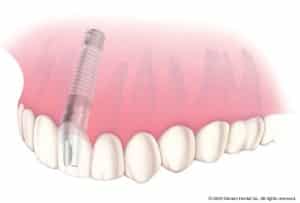 What is a Dental Implant?
What is a Dental Implant?
A dental implant is a titanium post that acts as an artificial tooth root.
An implant can be used to support an individual tooth or several implants can support a fixed bridge or stabilize a denture.
Implants are surgically placed in the bone. Afterwards, a device called an abutment is attached to the implant, which acts as an artificial tooth on which a single crown, a fixed bridge, or removable dentures connect.
Depending on your treatment plan, Dr. Kiser will provide you with detailed information regarding the type of dental implant you will be provided as well as the benefits & risks of your unique, individual case.
Teeth-In-A-Day
Teeth in a Day Implants (Hybrid Reconstructions) Implants can be used to restore a tooth, replace many teeth or a full arch of teeth!
Teeth-in-a-Day Systems are not a gimmick and are actually done.
Call (419) 756-2880 to schedule an appointment, or click here to send us a message.
Who Should Get Implants?
Almost anyone can get implants. However some conditions, called “risk factors”, are known to reduce the success rates of implants.
Risk factors include but are not limited to:
- Smoking and smokeless tobacco
- Cigarettes, cigars, & the chemicals in tobacco add substantial risk to the success of dental implants, especially during the healing phase
- Smokers should not be surprised if their implants fail
- Diabetes
- Better diabetic control can lower the risk of implants failing
- Insufficient bone
- In some cases where there is not enough bone to support a dental implant, you may receive a bone graft. Bone grafts are made from real or artificial materials.
- The bone is either harvested from cadavers, bovine, or synthetically derived
- Location
- Where the dental implant is placed affects the success rate. For example, if the ideal location happens to be in the same place as a main nerve bundle, the location must be changed.
- Location may affect the line-up of crowns or other appliances placed on the implant, causing a higher failure rate.
- Medications
- Some medicines such as those used to treat heart disease, long-term bisphosphonate use (to treat or prevent osteoporosis), & some other medications are risk factors of varying degrees
- Bruxism (grinding and/or clenching your teeth)
- Teeth grinding or clenching may cause dental implants to fail by introducing unusual forces
- There are options to assist with this problem, such as dental mouth guards
- Poor oral hygiene
- The same bacteria that cause most people to lose their teeth remain in your mouth even after the teeth are gone
- Failure to clean your mouth properly can cause a dental implant to fail
Risks: A small number of implants do not work. If an implant fails, we can often try to place it again





